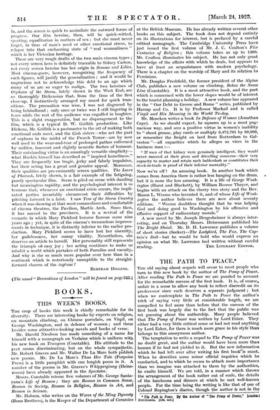BOOKS.
THIS WEEK'S BOOKS.
THE crop of books this week is chiefly remarkable for its diversity. There are interesting books by experts on religion, on mountain climbing, on Chinese porcelain, on Virgil, on George Washington, and in defence of women ; and these besides some attractive-looking novels and books of verse.
Mr. Harold Nicolson has made something of a name for himself with a monograph on Verlaine which is uniform with his new book on Tennyson (Constable). His attitude to the poet seems discriminating, but on the whole sympathetic. Mr. Robert Graves and Mr. Walter De La Mare both publish new poems. Mr. De La Mare's Thus Her Tale (Porpoise Press) is a little pamphlet with one longish poem in it. A number of the poems in Mr. Graves's Whipperginny (Heine- mann) have already appeared in the Spectator.
Messrs. Constable reissue five volumes of Mr. George Santa- yana's Life of Reason ; they are Reason in Common Sense, Reason in Society, Reason in Religion, Reason in Art, and Reason in Science.
Mr. Hobson, who writes on the Wares of the Ming Dynasty (Bean Brothers), is the Keeper of the Department of Ceramics at the British Museum. He has already written several other books on this subject. The book does not depend entirely on its illustrations for interest, but is prefaced by a careful critical monograph. The Cambridge University Press have just issued the first volume of Mr. J. C. Coulton's Five Centuries of Religion ; this volume takes us up to 1200. Mr. Coulton illuminates his subject. He has not only great knowledge of the affairs with which he deals, but appears to have at least an acquaintance with modern psychology. There is a chapter on the worship of Mary and its relation to Feminism.
Mr. Douglas Freshfield, the former president of the Alpine Club, publishes a new volume on climbing, Below the Snow Line (Constable). It is a most attractive book, and the part which is concerned with the lower slopes would be of interest to the tourist planning a holiday. A new volume has appeared in the " Our Debt to Greece and Rome " series, published by Harrap and Co. It is by Professor Mackail and is called Virgil and His Meaning in the World To-day.
Mr. Mencken writes a book In Defence of Women (Jonathan Cape). As we should expect, he squares up in a most pug- nacious way, and sees a positive virtue in women's inability to " shoot grouse, play cards or multiply 3,472,701 by 99,999, or remember the freight on lard from Rotterdam to Gal- veston "—all capacities which lie alleges as vices in the business man :-
" If men of that kidney were genuinely intelligent, they would never succeed at their gross and drivelling concerns—their very capacity to master and retain such balderdash as constitutes they stock-in-trade is proof of their inferior mentality."
Now we're off ! An amusing book. In another book which comes from America there is rather less banging on the drum, but it is none the less amusing. It is a life of George Wash- ington (Hurst and Blackett), by William Roscoe Thayer, and begins with an attack on the cherry tree story and the Rev. Mason L. Weems who invented it, and of whose Life of Wash- ington the author believes there are now about seventy editions. " Weems doubtless thought that he was helping God and doing good to Washington by his offensive and effusive support of rudimentary morals."
A new novel by Mr. Joseph Hergesheimer is always inter- esting, and on Thursday Messrs. Heinemann published his The Bright Shdwl. Mr. D. H. Lawrence publishes a volume of short stories (Seeker)—The Ladybird, The Fox, The Cap- tain's Doll—but he would be bold who would express an opinion on what Mr. Lawrence had written without careful reading. THE LITERARY EDITOR.


































































 Previous page
Previous page